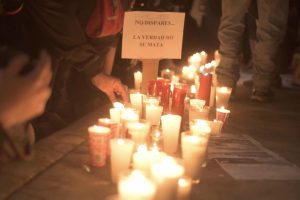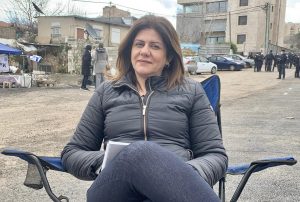The Coalition for Women in Journalism (CFWIJ) has released its account of a dismal month for journalists, with five deaths and a string of violations occurring throughout May.
It has been the bloodiest month for media professionals this year, with at least five female journalists killed in Mexico, Chile, Palestine and Afghanistan.
The NGO highlights that in addition to deadly attacks, professionals have been victims of at least 40 cases of serious press freedom violations, including arbitrary arrests, legal, physical and sexual harassment, online violence, threats, intimidation and deportation of a person. British professional in Afghanistan.
Women journalists are killed in the line of work or because of their work.
Violations documented by the CFWIJ during this period, women are more at risk than men in the practice of journalism.
Of the five female journalists killed in May, four people died in four days.
For the CFWIJ, it is women journalists who face the most serious threats to their safety, represented in both the online and offline world:
“[São ameaças que vão] from campaigns of misinformation and discrediting based on misogyny and sexism to more serious issues such as government harassment.
The problems faced by women journalists are not widely acknowledged. Newsrooms often keep their mouths shut about them; Governments are taking several steps to combat abuses against women journalists.”
First deaths recorded in May Mexican journalists Yessenia Mollinedo Falconi and Sheila Johana García Olivera, respectively the director and correspondent of the online news portal El Veraz. They were shot in front of a grocery store on May 9.
As both are threatened by the scope of local crimes, there are clear indications that the attack was planned and directed against them.

The organization underlines that the sharp increase in violence against journalists in Mexico is alarming. “The press faces threats from armed groups, influential economic and political elites, as well as criminal elements,” the CFWIJ says.
Of the 11 journalists killed in Mexico in 2022, four were women. Professionals from small and regional vehicles such as El Veraz, where Yessenia and Sheila work, account for the majority of crimes against registered media professionals in the country.
Yessenia’s brother, Ramiro Mollinedo Falconi, who is also a journalist, said that El Veraz was repeatedly threatened for covering crimes. Local journalists condemn the neglect of the state, which does little or in most cases nothing to protect them.
Read more
Two female journalists killed before demonstration against 9th death in Mexico
Journalist’s death in Palestine shook the world and rioted
Just two days after the death of Mexican journalists, the images of the murder of senior Palestinian-American Al Jazeera reporter Shireen Abu Akleh shocked the world and sparked outrage among the population that had watched her work on television for two decades.
this A journalist was shot in the head while covering an attack by the Israel Defense Forces (IDF) in the occupied West Bank on 11 May.. He was taken to the hospital, but was pronounced dead a short time later.
A video of this moment was shared on Twitter by a colleague of Shireen’s. The images, accompanied by traditional vests used in risk news and other members of the press whose identities were found at the scene, show their desperation and crying when they learned of the reporter’s death.
‘Wake up Shireen’. Al Jazeera correspondent Shireen Abu Akleh was pronounced dead after being shot by Israeli forces while covering in Jenin in the occupied West Bank. pic.twitter.com/YxRI5Ga60p
— Arwa Ibrahim (@arwaib) 11 May 2022
The Israeli state initially claimed that Shireen was killed by Palestinians, but later acknowledged that an Israeli soldier’s bullet may have hit the journalist during an alleged crossfire.
Analyzes by news outlets such as AP, CNN and others support eyewitness accounts of Al Jazeera reporter being deliberately killed by Israeli soldiers.
The day of Shireen’s burial was also a great turmoil and conflict for the Palestinians.
The ceremony, which should have been a funeral, turned into a protest with violent clashes between the Palestinians and the Israeli police. Because Abu Akleh’s coffin was covered with a Palestinian flag during the parade.
Israeli forces hoist Palestinian flags from Shireen Abu Akleh’s hearse. pic.twitter.com/8qTX9uCPV1
– Barry Malone (@malonebarry) May 13, 2022
Pressure on Israel to investigate the case brought together more than 30 human rights groups, press freedom advocates and the journalist’s family.
Read more
NGOs Ask Israel to Investigate Al Jazeera Correspondent’s Death; The Hague tribunal will be summoned
Journalist deaths in Chile and Afghanistan also marked May
Francisca Sandoval, correspondent for local broadcaster Canal Señal 3 La Victoria, Shot in the head while watching Labor Day protests in SantiagoIn Chile on 1 May.
He was severely injured and could not resist his injuries after 12 days in the hospital. The 30-year-old journalist became the first journalist killed in the country since Augusto Pinochet’s dictatorship ended in 1990.
A protest called by organizations and journalism students against Francisca’s death recorded clashes with police in Plaza de la Dignidad. On Twitter, Señal 3 La Victoria shared footage of police forces dispersing protesters with water jets.
#PlazaDignity / #JusticiaParaFranciscaSandoval pic.twitter.com/LWjr2NPN0E
— Senal 3 La Victoria (@tv_piola) May 13, 2022
At the end of May, the NGO CFWIJ counted a fifth murder of a female journalist in a month, this time in Afghanistan.
Maryam Madadi, who worked at Afghan radio station Rabia Balkhi, was killed on the 25th in a series of explosions in the town of Mazar-e-Sharif.
At least 9 people were killed and 15 injured in the attack. The Islamic State claimed responsibility for the attacks.
Meryem and all other victims of the attacks were declared to belong to ethnic and religious communities that were discriminated against by the fundamentalist group.
Besides being killed, women journalists are arrested.
May also marked a sad turning point for female journalists in Iran and Ethiopia, countries where media professionals have been arrested five times.
Iranian intelligence service arrested filmmakers Firoozeh Khosravani, Mina Keshavarz, Shilan Assadi and photographer Reyhaneh Taravati on May 9 and 10, without disclosing the charges, according to CFWIJ information.
Meskerem Abera, founding editor of Ethio Nekat Media, was arrested on 21 May on charges of inciting public violence by appearing in the Ethiopian media.
Journalist and human rights activist Meskerem Abera was kidnapped by Ethiopian authorities. Free @MeetMeski @CPJAfrika pic.twitter.com/YGwYaNsfRz
— አንድ አማራ (@One__Amhara) 21 May 2022
In another increasingly common form of repression by authoritarian governments seeking to silence the press, eight female journalists were arrested and released after a few hours or days in jail.
Cases occurred in Turkey (1), Russia (3), Zimbabwe (1), Ethiopia (2), and Afghanistan (1).
Six more women journalists faced state pressure and legal harassment in Russia (1), Serbia (1), Turkey (3) and Greece (1).
Access the full CFWIJ report detailing abuses against the press and women professionals in this section. connection.
read it too
Journalists arrested after Russia’s new repression method in Ukraine and released hours later
Women face organized online attacks and deportation
In Afghanistan, Taliban officials restricted the award-winning journalist Deputy Isobel Yeung’s work in Kabul and ordered her to leave the country “immediately”, CFWIJ reported.
He was also prevented from leaving the hotel after arriving in the city, and according to the journalist, the Taliban mentioned the problems in their report on violations of women’s rights in the country.
The deportation order for the reporter and his team came days after a new order from the fundamentalist group. women covering their faces in public and women journalists doing the same on the air.
The measure was widely discussed by professionals and organizations advocating freedom of the press.
The Taliban informed us that they refused to grant our shooting permits. They told us not to leave our hotel and leave Afghanistan immediately.
They raised issues with our alleged report on women’s rights and security concerns.
Leaving is a deep disappointment.
— Isobel Yeung (@IsobelYeung) May 13, 2022
Also in May, at least five female journalists faced organized online attacks in Turkey, which has made rapid progress in restricting press rights.
Journalist Seda Taşkın received death threats on social media for covering the funeral of famous music composer Ahmet Say.
Journalists Nevşin Mengü, Burcu Karakaş, Suzan Demir and Neşe İdil came under attack from supporters of the right-wing Victory Party (Victoria) for criticizing a short film with messages about refugees.
According to the NGO, the threats and intimidation of professionals used racist and misogynistic language.
read it too
source: Noticias
[author_name]


